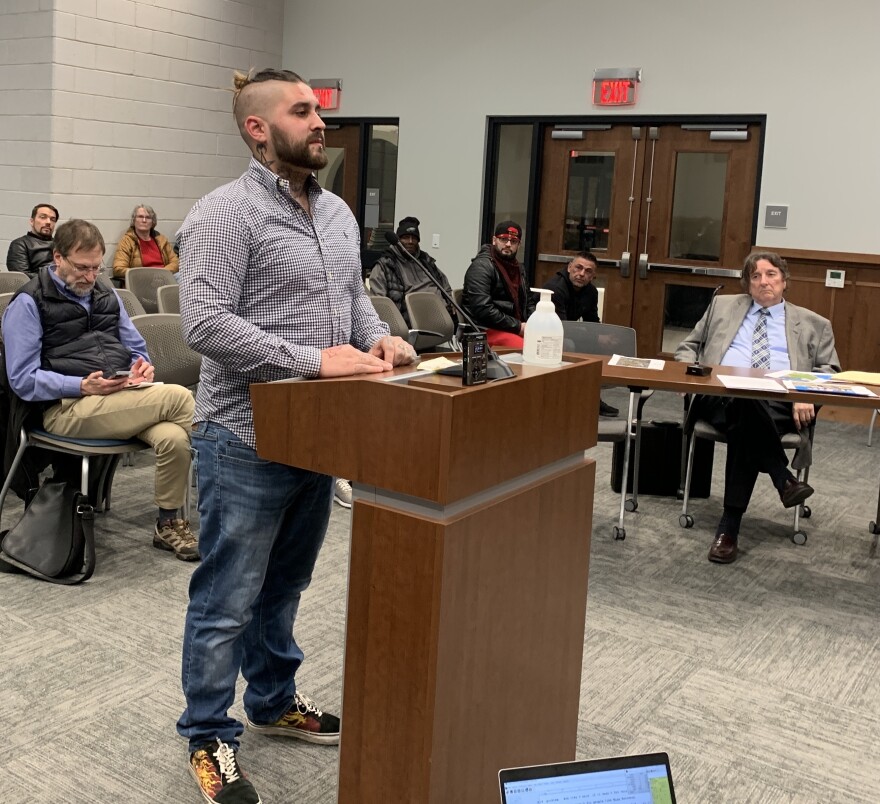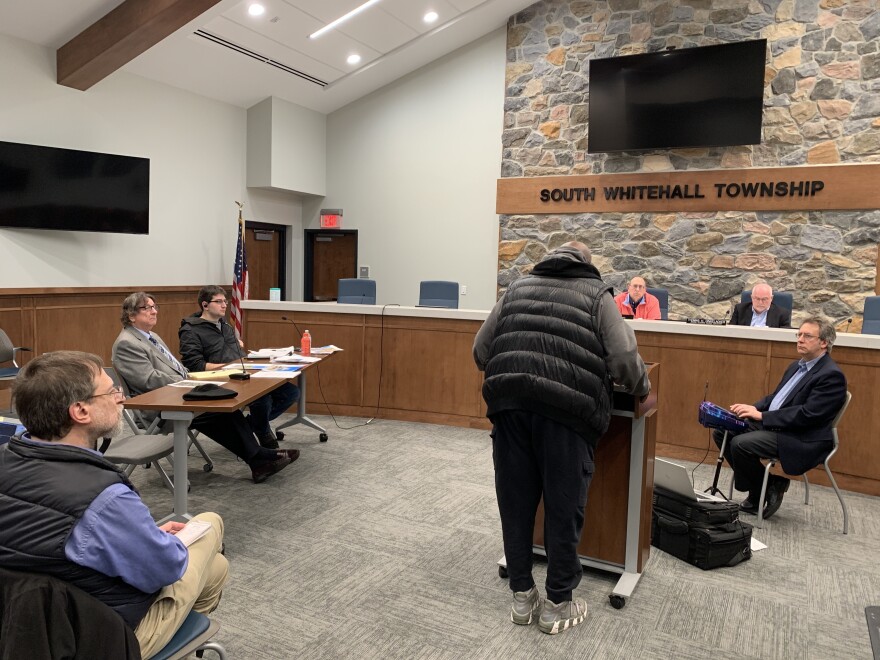SOUTH WHITEHALL TWP., Pa. — The lawyer for a company that wants to put a drug- and alcohol-recovery house next to Cetronia Elementary School said Tuesday the facility's character would be identical to the assisted living facility that used to be there.
But an attorney for Parkland School District who opposed the plan said that interpretation was too broad.
Tuesday was the fifth and final hearing about the proposed recovery house next to Cetronia Elementary.
- The final hearing about the proposed drug and alcohol recovery house next to Cetronia Elementary featured more public comment and closing statements from the parties in the case
- Public comment echoed sentiments from the previous hearing. In the closing statements, parties spoke about interpretations of the zoning laws
- A final decision about the ruling will be announced at a Zoning Hearing Board meeting in the coming months
The facility's proposed location used to be Trexler Park Manor, an assisted-living facility that closed in 2014. It's been vacant since.
Township zoning laws that cover the property allow for an assisted living facility, and applicant Moyer Construction LLC, which owns the land, argues that a recovery house is sufficiently similar in character and impact.
“The main and essential nature of an assisted living residence is a place where adults reside, and it is a place where adults are given assistance in order to survive," Nicholas Sabatine III, representing Moyer Construction, told the township Zoning Hearing Board.
While the services that assisted living facilities and recovery houses provide are not the same, "in this respect, a drug and alcohol recovery house is the same thing,” Sabatine said.
Sabatine's comments came during closing arguments in the case, in which the proposed facility would be put at 3599 Broadway.
He said there has been no evidence presented to suggest there is a significant difference between the municipal services required for recovery houses and assisted living facilities.
Sabatine also said there is an assumption that the residents of the house would pose a danger to the community, but the facility would only house recovering addicts.
“Addicts who don’t maintain their sobriety do not live in recovery houses. Period,” Sabatine said.
School District responds
But Parkland School District lawyer Matthew Deschler said Sabatine’s interpretation of the similarities in the character of assisted living facilities and recovery houses was too broad.
Deschler said Sabatine "kind of reduces it to a few common terms that you might apply to both — that they serve people and people live there. I mean, that can be true of a hotel, for example."
“[Sabatine] kind of reduces it to a few common terms that you might apply to both — that they serve people and people live there. I mean, that can be true of a hotel, for example,”Matthew Deschler, the lawyer for Parkland School District
Deschler argued that recovery houses are not similar in character to assisted living facilities because the regulations for assisted living facilities are more extensive.
Deschler also cited the definition of assisted living residences in the township zoning ordinances, which he said states that “the term assisted living residences shall not include drug and alcohol rehabilitation facilities.”
Deschler argued that a recovery house provides rehabilitation to its residents.
Andrew Hoffman, the lawyer representing South Whitehall Township, started his closing statement by repeating that the township “has no prejudice or ill will toward anyone who is seeking recovery,” but is opposing the proposed facility because it does not follow the zoning ordinances.

Hoffman said a recovery house is not similar enough in character to an assisted living facility. In general, he said, zoning laws contain very particular distinctions between different types of facilities.
“We cannot stop our analysis of the issues in this matter with the observation that the proposed use of a drug and alcohol recovery house and assisted living residences are both houses where people receive support,” Hoffman said.
“Zoning requires that we look deeper. Zoning draws many distinctions which force attention to details.”
Hoffman argued the applicant did not show during testimony that the impact of the recovery house would be similar to that of an assisted living residence.
Recovery houses are privately owned homes for people recovering from drug or alcohol addiction — typically for people exiting drug rehabilitation programs. The facilities typically have a sobriety requirement.
They can be certified by the state, but that's not required for them to operate. Rios said the proposed facility would be certified.
The property would house 38 residents and four managers, according to Jeremy Rios, co-owner of Rios Recovery LLC, the company that would operate the facility.
Public comment continues

Tom Nesfeder, who spoke with LehighValleyNews.com during a tour of a Rios Recovery LLC recovery house, also spoke at the hearing.
He said the proximity of the recovery house he lives in to Ramos Elementary, which is about a block away, has not been an issue.
Nesfeder said as house manager of the facility, he is trying to save people’s lives.
“I didn't want to come to talk tonight. But I figured I'd do it because the people that this house could save can't be here. They don't know it’s going to save their life,” Nesfeder said. “So I'm trying to give a voice to people that aren't here to let their voice be heard.”
"The people that this house could save can't be here. They don't know it’s going to save their life. So I'm trying to give a voice to people that aren't here to let their voice be heard.”Tom Nesfeder, house manager for a Rios Recovery LLC recovery house
South Whitehall resident Chris Pirrotta, a parent of two children who attend Cetronia Elementary School, spoke again after providing comment at the previous hearing.
Pirotta said recovery houses are not like assisted living facilities because they do not require 24/7 staffing.
“Unfortunately, the state doesn't have those rules, doesn't have that requirement, and doesn't have those checks and balances that parents like myself would like to see in a facility,” Pirrotta said.
William Allen, another party in the case, also provided a closing statement.
Zoning hearings allow people to be designated parties if they have a vested interest in the decision. Allen is a nearby resident who also said he is a recovering addict.
Allen said there are “no similarities” in character or impact between recovery houses and assisted living facilities. He also said the assumptions residents have made about the residents of the house may be justified.
“We've heard that we, as addicts, that society owes us something, because of the stigma of being an addict. We earned that right,” Allen said. “And I'm talking about it as a recovering addict for 43 years. We earned the right to have a stigma placed upon us because of our bizarre behavior.”
Resident controversy
There was controversy on social media surrounding the location of the proposed recovery house when the issue first came before the zoning hearing board. A Facebook post about it was shared more than 50 times.
The comments included residents who opposed the construction of the facility because of its location near the school. Others supported it, saying recovery houses are needed in the area.
In an earlier interview, co-owner of Rios Recovery LLC Taihla Rios said the company is considering other locations for new recovery houses, but would like to build one at this location because there is more space and it could be a larger community than the others.
“We could do bigger and better things with this space,” Taihla Rios said.
Solt will issue a report about the hearings within 45 days from Tuesday’s hearing. After that, the Zoning Hearing Board will convene to announce its decision.


